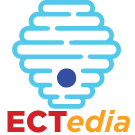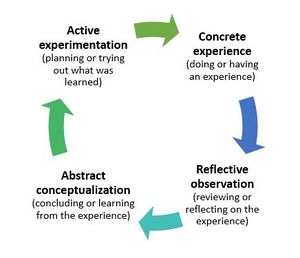Experiential Learning: Difference between revisions
Tanvivartak (talk | contribs) No edit summary |
Tanvivartak (talk | contribs) |
||
| Line 4: | Line 4: | ||
= Models of Experiential Learning = | = Models of Experiential Learning = | ||
{| class="wikitable" | |||
|+ Caption text | |||
|- | |||
! Header text !! Header text !! Header text | |||
|- | |||
| Example || Example || Example | |||
|- | |||
| Example || Example || Example | |||
|- | |||
| Example || Example || Example | |||
|} | |||
== Kolb's Experiential Learning Model == | == Kolb's Experiential Learning Model == | ||
Revision as of 14:14, 24 February 2023
Overview
Experiential learning builds on the work of Piaget, Lewin and Dewey [1]. It consists of several models that stress the importance of direct experience and reflective observation
Models of Experiential Learning
| Header text | Header text | Header text |
|---|---|---|
| Example | Example | Example |
| Example | Example | Example |
| Example | Example | Example |
Kolb's Experiential Learning Model
David Kolb [2] proposed that experience was critical in developing knowledge construction, as learning occurs through discovery and active participation. Kolb defined learning as “the process whereby knowledge is created through the transformation of experience” (Kolb, 1984).
Stages of Learning
According to Kolb's experiential learning model, there are four stages central to experiential learning.
- Concrete Experimentation - In this stage, each learner engages in an activity or task, which may be completely new or a reimagined experienced of the past. For learning to take place, the student must actively engage in the task
- Reflective Observation - - The learner in this stage steps back from the task to reflect on the task experience. This stage allows the learner to analyse the findings of the data and information collected while performing the task and reflecting on it.
- Abstract Conceptualization - The next step in the learning cycle is where the learner attempts to conclude the experience by reflecting on their prior knowledge, using ideas with which they are familiar or discussing possible theories with peers. The learner moves from reflective observation to abstract conceptualization when they begin to classify concepts and form conclusions on the events that occurred. This involves interpreting the experience and making comparisons to their current understanding of the concept. Concepts need not be “new”; learners can analyze new information and modify their conclusions on already existing ideas.
- Active Experimentation
This stage in the cycle is the testing stage. Learners return to participating in a task to apply their conclusions to new experiences. They can make predictions, analyze tasks, and make plans for the acquired knowledge in the future. By allowing learners to practice their knowledge and show how it is relevant to their lives, you are ensuring that the information is retained in the future.
As Kolb’s learning theory is cyclical, one can enter the process at any stage in the cycle. However, the cycle should then be completed to ensure that effective learning has occurred. Each stage depends on the others, and all must be completed to develop new knowledge.
Critique
One critique is that the model oversimplifies the learning process by assuming that it occurs linearly and sequentially while learning is often more complex and iterative in reality [3]. Additionally, the model may not adequately account for individual differences in learning styles and preferences and may not apply to all learning situations.
Secondly, the model is too focused on cognitive processes and may neglect the role of affective and motivational factors in learning. For example, emotions, attitudes, and beliefs may significantly shape an individual's learning experience, but the model does not explicitly account for these factors.
Lastly, the model is overly prescriptive and may not allow for the flexibility and creativity necessary for effective learning. By emphasizing a particular learning cycle, the model may not adequately account for the diverse approaches and strategies that individuals may use to learn and problem-solve.
Example
Evidence
Implications and Design Critique
Learner Diversity and Implementing on scale
According to Meyer [4] one drawback of experiential education is that it can be challenging to scale and apply systematically and consistently. Experiential education emphasizes individual and context-specific learning experiences; it may be challenging to design and implement a consistent curriculum that meets the needs of all learners. This can be particularly problematic in large or online learning environments, where providing personalized and interactive learning experiences for each student may be difficult.
Evaluations and Assessment
Experiential education often emphasizes process and context over standardized outcomes [5] , which can be challenging to measure and evaluate using traditional assessments such as tests or quizzes. This can make assessing and evaluating learning outcomes challenging, particularly in environments where standardized testing is a crucial measure of success.
Abstract Learning
While hands-on experiences can be valuable for acquiring practical skills and knowledge, they may not always promote critical thinking, reflection, and engagement with theoretical concepts [6]. This can be particularly problematic in fields such as science or engineering, where abstract ideas and theories are critical to success.
Conclusion
References
- ↑ Nielsen-Englyst, L. (2003). Game design for imaginative conceptualisation. Proceedings of the international workshop on experimantal interactive learning in industrial management, Allborg (pp. 149 – 164)
- ↑ Kolb, D. (1984). Experiential learning: Experience as the source of learning and development. New Jersey7 Prentice Hall.
- ↑ Fenwick, T. (2001). Experiential learning: A theoretical critique from five perspectives. Information Series No. 385. ERIC Clearinghouse on Adult, Career, and Vocational Education. https://files.eric.ed.gov/fulltext/ED464321.pdf
- ↑ Meyer, J. P. (2010). The potential and limitations of experiential learning in management education. Academy of Management Learning & Education, 9(2), 260-266.
- ↑ Harris, D. L., & Pecore, J. L. (2018). Balancing the Tensions Between Experiential Learning and Traditional Assessment in Higher Education. In Exploring the Intersections of Experiential Learning and Student Engagement (pp. 1-23). IGI Global.
- ↑ McCarthy, M. A., & Peach, D. (2019). Experiential learning: from theory to practice. Assessment & Evaluation in Higher Education, 44(3), 387-399.

